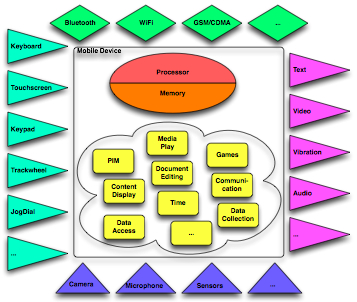Walt Mossberg has concisely and elegantly laid out the problems affecting the mobile phone industry in the US (where I’m located). He talks about our carriers and how they have the ability to dictate what phones we can use with their services, and even the software that we can use.
It’s not that way elsewhere. Anyone can buy a GSM phone in Europe and then choose a carrier. In Australia when I visited a couple of years ago, my friends loaned me one of their old phones, and I went a bought a SIM card (the hardware you change to run with one carrier versus another) with a fixed amount of minutes that let me call for the 2 weeks we were there. I brought my Treo, but only to use as a PDA, since it was a CDMA not a GSM phone (we have two systems in this country that don’t play well together), and even if it’d been a GSM phone, the card probably would’ve been inaccessible.
Why is this important? Mobile learning will advance faster if there’s more interoperability, as investments will amortize farther. Moreover, many possibilities will not see the light of day due to the requirements of working with the carriers who’s short term profits demand onerous fees to use their capabilities. Several of us had a new service to offer until we realized what it would cost to try to make it work with the carriers. Or, as Walt puts it:
“It severely limits consumer choice, stifles innovation, crushes entrepreneurship, and has made the U.S. the laughingstock of the mobile-technology world…”
Oof! I’ve seen similar problems elsewhere: the cost of data in Taiwan, for instance, keeps them from really taking advantage of their concentrated population and opening up new commerce areas. There are amazing things happening in places where there is an open field, and even amazing things happening despite these barriers. I just wonder what could be done without these self-defeating approaches…


